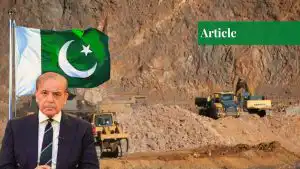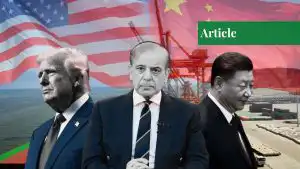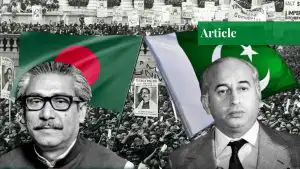Brigadier Syed Mushtaq Ahmed (Retd) has extensive experience in areas of national security, intelligence and strategic issues. He has worked as a senior research analyst in a strategic organisation and has a niche for writing research articles and analytical assessments, specializing in counterintelligence, counter-terrorism and nuclear security.
The Carnegie Stimson report titled “A Normal Nuclear Pakistan” implicitly presupposes Pakistan’s manifold economic and societal weaknesses and abnormalities are not befitting a nuclear Pakistan, tempting one to question the inviolability of such an assertion. Ironically, such an aphorism of Pakistan and its identity crisis and abnormality has come to stay, assuming some sort of fixation and permanence with our national stability and identity, giving way to some fundamental inquests, which may appear bizarre, time-barred, or redundant, but perhaps necessary to place things in correct perspective and more importantly, when the ills of the past have once again begun to rile, the recovery may well be necessary to affect a perceptual correction, if warranted.
A Crises of National Identity
The abiding question that intrigues and irks is, “Why is Pakistan in such a mess?”
The answer may be puzzling, mindboggling, and terse, but yet has to be contended with since it lies in the country’s origin and genetics; and to satisfy such inquiries, one has to turn the pages of history to discern the basis of its creation—whether it was an ideological necessity or a politico-economic compulsion or a bit of both because the fact that even though the Muslims ruled and cohabitated with other nationalities of the sub-continent for more than half a millennium, there was never a clamour for a separate nation. But in the post-1857 period, the spectre of socio-cultural dominance and politico-economic persecution by the Hindu majority triggered the notion of the “two-nation,” as underscored by Babar Ayaz in his seminal research, “What is wrong with Pakistan?”
The resultant struggle was conceived and pursued based on this dictum of “Two-Nations,” which they were not. “Adherence to this theory has kept Pakistan unstable….; the country remains a multi-national state—a fact constantly denied by its ruling establishment.”
The assumption that the socio-cultural, ethnic, and lingual diversity gelled by religion would keep the country together and united is fallacious, to say the least, as has been evidenced through various ethno-nationalist movements of yesteryears: Bangladesh, Sindhudesh, Pakhtoonistan, and yearnings for Azad Balochistan et al.
Also, the effort to construct a nation based on faith alone, where ethnicities even predate religion, did not find the requisite binding strength. Therefore, the construct has remained weak and ephemeral. Nonetheless, to give moorings to its existence and give wind to Pakistan’s sails (idea), “an ideology had to be created—though alien and different from its roots, identity, and realities,” contends Salman Rashid, the famous travel writer.
Hence, the ethno-nationalist units (in the North-Western and Eastern zones of India), where Muslims were in the majority, were knotted with the Islamic chord into a federation of sorts to constitute “Independent States”—not a state, in which the constituent units should be autonomous and sovereign—as was also demanded in 1940 Resolution.
Judging on the scales of Nietzsche’s consequentialist theory, though the outcome of ideology has been disastrous, we are still stuck in the same ideological bent—isn’t it incomprehensible? With little or no intent to affect a correction course, we instead went further beyond in the 80s to Islamize the society for more national amity and cohesion. Eventually, we ended up radicalising the ideology with the devastating outcome of sectarianism, among others. The bane of religious extremism and intolerance gave way to militancy, terrorism, and unending proxy wars that we continue to fight in our backyard at the immense cost of blood and treasure.
Historical Distortions
In a nutshell, the historical facts were distorted or omitted to promote personal and pseudo-nationalist agendas. Still, contrarily, such undertakings only fuelled parochialism and ethnic tensions that forged a fragmented society, as has been theorised by KK Aziz in his book, “The Murder of History.”
All along, a relentless effort has been made to replace real history with state-dictated (sic distorted) history, enforcement of which rendered almost all nationalist leaders as traitors working against the interests of the state. Ironically, it was We (the State) against Them: Bacha Khan, Fatima Jinnah, Mujeeb Ur Rehman, GM Syed, Sardar Bugti, Altaf Hussain, or Imran Khan. If Jinnah or Iqbal were to return to the country today through divine intervention, they might well be castigated for their secular, enlightened, and democratic ideals and consigned to the gallows.
Security Paranoia
The Indian-fear factor has transformed the country into a security state, wherein security is visualised in a subjective and not comprehensive sense. This narrow view of security weighs heavily on our policy-making, giving the military the final say in anything and everything in the name of national security, and over time, has been crowned with the custodianship of ideological and geographical frontiers. Its role is pervasive and indulgent in all spheres of the government, with no holds barred. Hence, titles like the “Garrison State” have rightly become an acceptable cliché in our intellectual and political thinking. Whereas, after becoming a nuclear state, Indo-phobia should have been mitigated with a visible reduction in the defence budget and a corresponding increase in social sector development.
Ironically, however, the Indian hyphenation continues to exert pressure on our fiscal spending due to the compulsion of maintaining a minimum credible deterrence, with the concomitant compulsion of maintaining a large standing army to stave off the limited wars, if any, but also to deal with the incidence of many proxy wars that the defence forces have now to fight. The transition from the external to the internal front is a new dimension of warfare, often ascribed to the handiwork of the inimical forces. Our erstwhile strategy of bleeding India with a thousand cuts has boomeranged with a vengeance, exploiting our intrinsic fault lines and political blunders.
Whither Democracy
Be that as it may, Pakistan was a result of a democratic movement and not an outcome of an armed struggle, and its future lies in a democratic process, in its pristine form and not in an adulterated form or through a controlled democracy. The Quaid, too, professed and envisioned a Democratic Parliamentary Republic, but over the years, the country changed hands from a culpable democracy, giving way to a robust autocracy and settling over to a hybrid democracy.
The miltablishment’s penchant for intervention has been the root of all problems that have stymied the functioning of other state institutions. Invariably, the civilian governments were discredited and shown the door on the pretext of corruption, nepotism, bad governance, etc. Thus, the civil-military role, as defined by Jinnah, has been at the altar throughout our history. He was indeed explicit about the military’s subservient role.
“….Do not forget that the armed forces are the servants of the people. You do not make national policy; it is we, the civilians, who decide these issues, and it is your duty to carry out these tasks with which you are entrusted.”
– Jinnah’s speech at Staff College on 14 Jun 1948
Ironically, the establishment’s domineering role has gained traction in politics—the game that started in 1958 is still on. Sadly, we have learned nothing from history.
On the contrary, our neighbour India diligently pursued the democratic course, succeeding in keeping the multitude of ethnicities and nationalities in a happy union—venting their despair, disagreements, and aspirations through a democratic process. Had they also followed a Bonapartist course, their fate would have been no different, with states running amok, in turmoil, and vying for independence. The centrifugal forces were too strong, given the integral ethnic, linguistic, racial, religious, and cultural differences/faultiness.
Miltablishment and its Defining Role
If there is one thing permanent in this country, it is the military’s monopoly of politics. Whether it has been in power directly for over three decades (1958-1971, 1977-1988, and 1999- 2008) or micro-managed the political governments, its presence has been omnipotent.
“All politicians in the post-Zia period believed in the paramountcy of the army as an article of faith.”
– Pakistan Behind the Ideological Mask: Facts about Great Men We Don’t Want To Know By Khaled Ahmed
It is generally believed that the establishment’s interest warrants a weak democratic rule to have their say in the country’s dispensation, the way they deem fit, to put the house in order. Although this do-it-all “nation-building approach” is of good faith and intentions, it is at the cost of marginalising and weakening the political plank.
The military’s idiosyncratic style of doing things its way and taking the ship out of the storm is self-serving, as are arguments that we have done it before and can do it again. Ironically, however, the “do it alone” style has not served us in our 77 years of direct or indirect rule, but only for brief periods of development and reformation, and perhaps nor will it in the future.
Furthermore, as the military adage goes, “You never reinforce a failure,” yet here we are, bent upon relentlessly pursuing the forbidden dictum. This speaks of our predisposition to repeatedly playing the old orchestra, using and employing the same characters (kleptocrats).
The mil-engineered regime change by the assumed corrupt and bankrupt political elite induced political turmoil and uncertainty that resulted in the consequent instability continuum.
The old chhappas (copies) are considered a shortcut to every problem rather than striving for new pragmatic solutions, which comes from the realisation that miltablishment’s monopoly and hold over the polity is on the wane and a constant decline against the increasing clamour for change, freedom, and democracy, driven by populism, as it has been evidenced elsewhere—be it Indonesia, Turkey, Myanmar, or Bangladesh.
It’s time that we come to grips with this realisation and affect a correction course in deference to the aspirations of the people and, in so doing, salvage the institutional pride, dignity, and repute.
Agitational Politics
Yet another anomalous bane is our dysfunctional political system—a perpetual oddity, transforming into default regimes, where their survival rests on the establishment’s support. The factors that doom them to collapse are the well-known 5Cs: Corruption, Cronyism, (in) Competence, (in) Capacity, and (in) Capability.
The existing political parties are more adept at opposition roles than the issues concerning their polity and the state. The politics of confrontation, agitation, and intolerance have led to a highly polarised political system, where personal vendettas not only among the political leaders but also the tiff between Khakis and the Civies, i.e., Ayub/Zia-Bhutto, Musharraf/Bajwa-Nawaz, or Bajwa/Asim-Imran shape the political environment.
Also, the parties are personality-centric, evolving into dynasties and political fiefdoms rather than thriving on robust institutional frameworks—evolving into an incongruous democratic order, which throws up lacklustre and hapless leadership, bereft of any vision, commitment, drive, and energy. The endless tug of war and power politics have put the system on tenterhooks and in an indefinite transition.
“We have always voted a government in but never voted one out,” contends Ayesha Jalal at the Harvard Public Review. Isn’t it strange that a Prime Minister has never been able to complete his full term in office in the country’s history?
Judicial Independence or Dependence?
The judiciary’s role has been inimical in many ways to the country’s democracy. From its collaborative role in the initial post-independence decades to its activist and interventionist role in the 90s to the ambitious tutelary role in the new millennium, the judiciary tried to create a niche for itself in the political system.
The notorious judicial verdicts ranging from curtailing Parliament powers (Maulvi Tamizuddin case-1954) to justifying military takeovers invoking the infamous “Doctrine of Necessity” (Gen Ayub-1958, Gen Zia-1977, Gen Musharrf-1999) to the judicial murder of a popular Prime Minister (Zulfiqar Bhutto-1978) to the disqualification of elected Prime Ministers (Yousaf Raza Gillani-2012, Nawaz Sharif-2017) to the delaying of elections (2023), all have cast a dark shadow on Judicial independence.
The instant effort to pack the superior courts with pliant judges to have an obliging and dependent Judiciary, which plays second fiddle to civil-military bureaucracy, marks a new low in the chequered judicial history serving political ends instead of justice.
Down the Lane
Though Pakistan has come a long way (77 years and counting) from Nehru’s prophecy of Pakistan not lasting more than six months, the path we traversed has been acrimonious and laden with pitfalls and challenges—though self-created rather than imported, indigenous rather than foreign, temporal rather than lasting and self-destructive rather than progressive. So, if we are to move forward with dignity among the comity of nations, we ought to make a fresh start based on setting the records straight, and for that, it is imperative to establish some sort of truth and reconciliation commission.
And for a change, if the establishment stands to its oath and vows (neutrality vow being the latest), becomes really apolitical, and gives true democracy a chance, we have not only a real chance but also the resolve and resilience to bounce back—after all, it is not only the khakis but the entire multitude of 250 million who are equally patriotic, nationalist, faithful, and concerned about country’s security, stability, and progress.
While the to-do list may be exhaustive and not the scope of this article, I would still like to enlist a few capstone imperatives;
- The first imperative towards this end is to undo the distorted history that has been forced upon us. As Hegel said, “If you snatch nation’s history, you snatch their future.” We ought to do away with all such efforts that enforce identity, ideology, and faith, as Jinnah hinted at keeping the faith out of the political calculus. “You are free to go to the temples; you are free to go to your mosques or to any other place of worship in this state of Pakistan. You may belong to any religion or caste or creed that has nothing to do with the business of the state.”
- Second, stabilise the internal front through an all-comprehensive approach, where the political effort is given the lead role as the solution is political and not military, and the latter is only used sparingly but decisively under a civil diktat. The acronym SIPS (Solution is Political Stupid) should become an imperative edict in the country’s governance. Hence, what is needed the most is a centripetal political effort that could only stem the abiding centrifugal aberrations.
- Third, uphold the supremacy of law—a law that is the same for everyone and where there are no holy cows. This alone would cater to true accountability and not a selective one, which has often been used as a political implement. The supremacy of law, however, is contingent on an independent judiciary that ensures the rule of law and not rule by law.
- Fourth, the institutions, including the military, should be reformated and structured on meritocracy.
- Fifth, instituting a true democratic order, which could only be possible by an enabling hand of the establishment. If done, it would be a great service to the state that would condone all their past omissions and commissions. Instituting democratic reforms and ensuring free and fair elections through an independent election commission hence remains an earnest, essential necessity and obligation.
Finally, it is all about constitutionalism. It’s about time that we recognise, learn, and respect its value and that of democratic inclusiveness (sectarian, ethnic, linguistic, socio-economic, and political) if we are to progress and prosper.
If you want to submit your articles and/or research papers, please check the Submissions page.
The views and opinions expressed in this article/paper are the author’s own and do not necessarily reflect the editorial position of Paradigm Shift.






